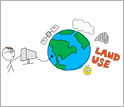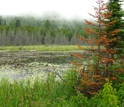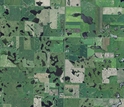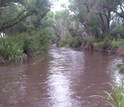News Release 14-019
Data-intensive ecology needed to understand what makes the biosphere tick
Journal special issue reports new findings on macrosystems biology: biological sciences writ large
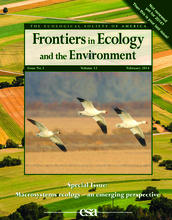
This special issue highlights research conducted through NSF's MacroSystems Biology program.
February 3, 2014
This material is available primarily for archival purposes. Telephone numbers or other contact information may be out of date; please see current contact information at media contacts.
Find related stories on NSF's Macrosystems Biology program at this link.
Have you looked closely at a local pond, meadow or forest--or at nature in your suburb or city--and observed changes in it over time? That's exactly what scientists are trying to do on a larger, regional to continental scale--a macrosystems biology scale.
Macrosystems biology might be called "biological sciences writ large."
Scientists funded by the National Science Foundation's (NSF) MacroSystems Biology Program are working to better detect, understand and predict the effects of climate and land-use change on organisms and ecosystems at regional to continental scales.
The researchers have published new results in this month's special issue of the journal Frontiers in Ecology and the Environment, published by the Ecological Society of America.
The ecologists are asking questions such as: How are regional-scale processes in plant and animal invasions, and in disease transmission, shaped by continent-wide environmental and land-use patterns? How can continent-wide data lead to better forecasts of disease outbreaks? How do invasive species and infectious diseases arrive at new locations, sometimes across great distances?
"Scientists conducting macrosystems biology research are working to find answers to these complex questions," says John Wingfield, NSF assistant director for Biological Sciences.
"Current knowledge of the biosphere is largely based on research in small plots of land and on satellite-scale remote sensing," says Wingfield. "But the insights needed to answer critically important questions about the biosphere's future can't always be extrapolated from such studies. They require new approaches."
Now macrosystems biologists are entering a new realm: that of big data.
"Ecologists can no longer sample and study just one or even a handful of ecosystems," says Patricia Soranno, a scientist at Michigan State University and co-editor of the special issue with David Schimel of the California Institute of Technology's Jet Propulsion Lab.
"We also need to study lots of ecosystems and use lots of data to tackle many environmental problems--such as climate change, land-use change and invasive species--because such problems exist at larger scales than other problems we have faced in the past."
Soranno and Schimel worked with many researchers, all funded by NSF's MacroSystems Biology Program, to produce the special issue.
"Data-intensive science is being touted as a new way to do science of any kind, and we think it has a lot to offer ecology," says Soranno.
"Traditionally, ecologists are trained to study and take samples from the field in places like forests, grasslands or wetlands, and measure things in the lab.
"In the future, many ecologists will also need to be trained in advanced computational methods that will allow them to study complex systems using big datasets."
Researchers have accumulated decades and decades of data. The sources include small, individual projects by university biologists; government agency scientists monitoring natural resources; terabytes of data from new or existing field sensors and observation networks; and millions of high-definition satellite images.
Easier access to supercomputers is paired with a near-endless deluge of data. Analyses that once took months or years can now be conducted in hours or days. Scientists also have access to the latest statistical modeling and geographic information system tools, says Soranno.
"Ten years ago, it would have been much harder to take this approach," she says. "We didn't have the intersection we have today of great tools, volumes of data, sufficient computing power and a growing understanding of natural systems at broad scales."
The makeup of macrosystems biology research teams should reflect the demands of data-intensive ecology, these researchers believe. Groups should include database managers, data-mining experts, GIS professionals and others, they say.
"An important question we're facing is how ecologists can best solve many of today's top environmental problems, challenges that need a broad-scale approach," Soranno says.
"From the research that has already been conducted by macrosystems biologists, evidenced by the papers in this special issue, we think we're on the right path."
It's where science needs to go, say these papers' authors, to understand what makes Earth's biosphere tick.
The research papers in the special issue can be accessed online at the Frontiers in Ecology and the Environment website.
-NSF-
-
View Video
View an animation of ecology in a world of big data.
Credit and Larger Version -
Thousands of lakes are being compared through a macrosystems biology grant from NSF.
Credit and Larger Version -
The ecological homogenization of urban America is the subject of an NSF macrosystems biology award.
Credit and Larger Version -
Macrosystems biologists are entering the realm of "big data;" here a visualization of street trees.
Credit and Larger Version -
NSF-supported macrosystems biologists are studying agricultural landscapes in North Dakota.
Credit and Larger Version -
Macrosystems biologists are conducting research on the resilience of river basins.
Credit and Larger Version
Media Contacts
Cheryl Dybas, NSF, (703) 292-7734, email: cdybas@nsf.gov
Layne Cameron, MSU, (517) 353-8819, email: layne.cameron@cabs.msu.edu
Liza Lester, ESA, (202) 833-8773 x 211, email: llester@esa.org
Related Websites
2013 NSF MacroSystems Biology Awards: http://www.nsf.gov/news/news_summ.jsp?cntn_id=129239
2011 NSF MacroSystems Biology Awards: http://www.nsf.gov/news/news_summ.jsp?org=NSF&cntn_id=121279&preview=false
Special Issue: Frontiers in Ecology and the Environment: http://www.frontiersinecology.org/
The U.S. National Science Foundation propels the nation forward by advancing fundamental research in all fields of science and engineering. NSF supports research and people by providing facilities, instruments and funding to support their ingenuity and sustain the U.S. as a global leader in research and innovation. With a fiscal year 2023 budget of $9.5 billion, NSF funds reach all 50 states through grants to nearly 2,000 colleges, universities and institutions. Each year, NSF receives more than 40,000 competitive proposals and makes about 11,000 new awards. Those awards include support for cooperative research with industry, Arctic and Antarctic research and operations, and U.S. participation in international scientific efforts.
Connect with us online
NSF website: nsf.gov
NSF News: nsf.gov/news
For News Media: nsf.gov/news/newsroom
Statistics: nsf.gov/statistics/
Awards database: nsf.gov/awardsearch/
Follow us on social
Twitter: twitter.com/NSF
Facebook: facebook.com/US.NSF
Instagram: instagram.com/nsfgov



